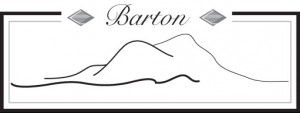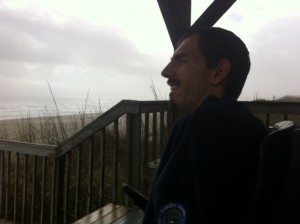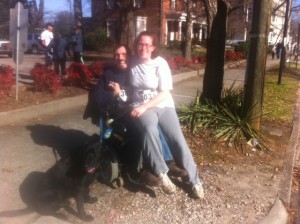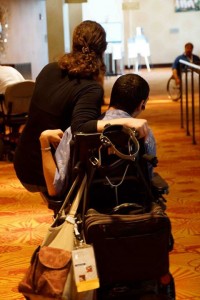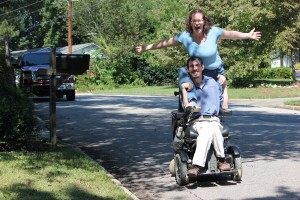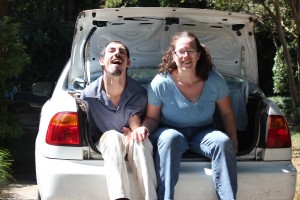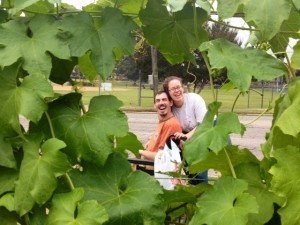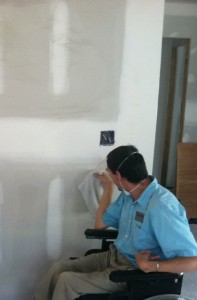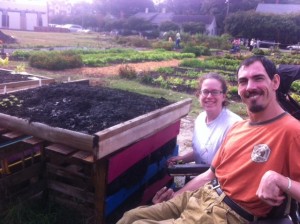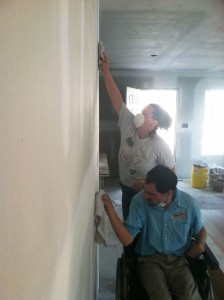For the last few years, we’ve been on a journey toward full mobility for Barton out on the road. Megan’s non-accessible Honda had lived through 255,590 miles of experiences, and it felt like the Honda was part of who we were for so long. If you don’t know what we mean, check out this awesome story from Snap Judgment that beautifully expresses the same sentiment.
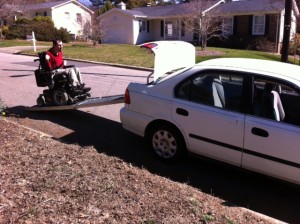
From this…
But the reality is the Honda Civic was done. Before long, we knew we would be walking on the streets. And, Barton could never be fully independent when we travelled in it anyway.
What does not having transportation do to a family?
Certainly we have had those feelings, not knowing how to get Barton to work, or having to turn down workshops, seminars, networking events, outings and travel excursions because we just couldn’t figure out how to get there.
One night Barton had an after hours meeting across town. And while we had contracted an accessible taxi, there was a miscommunication between the driver and dispatcher, which left Barton waiting on the side of the road until after 11pm.
As independent as we are, not having reliable transportation is like living in a cage, and not being able to get out.
We were determined not to stay there.
We entered the NMEDA Mobility Awareness Contest, and Barton even made it to the semi-finalist level in May. Didn’t make the final cut. We approached accessible dealers and manufacturers to be a spokesman, especially since we had just published our memoir. Not interested. We were thankful to Van Products, who sponsored several of our speaking engagements in early 2013. We tried to reach out to celebrities known for their compassion and generosity. The crickets were even silent. We started a Go Fund Me Campaign, and we received a number of donations from close family and friends. But it just wasn’t good enough.
As much as it sucks, sometimes the answer is going to be no. Or not right now.
We decided to give back to the community knowing how important it was to reciprocate those who supported us; and we finally peaked the interest through crowd sourcing, and caught the eye of The Mobility Resource. Author Jeff Gorman’s article was republished by The Huffington Post! And still, there was a big funding gap.
Did you know that a new BMW featuring the top level of green efficiency costs around $42,000. And families affected by disability are required to come up with more money than high-end sports cars? It’s a little crazy.
Average models of converted accessible mini-vans can cost up towards $55,000 to $65,000 and we knew we just couldn’t do it on our own. But we were determined not to give up. Over the year we strived on, frustrated, hopeful, excited, devastated, hopeless, depressed, thrilled—a whole range of emotions ran through each of us.
Not only that, but we brought many others along for the ride. Our friends, family and colleagues were also disappointed we didn’t win the NMEDA contest, they heard our struggles to regroup and move forward, our conflicts of cost and reliability, our struggle over getting to work and events, and our dreams of “if only we could…”
In the end, all it took was one comment, one phone call, one day, and a lot of luck.
After an amazing jazz fundraising event hosted by a phenomenal community at Christ Church of Raleigh, we knew we had given it our all, and it was time for us to go to work. We researched van models, type of lifts/chassis, and compared mobility manufacturers. After hours pouring over research, we still only had a very small list of workable options.
What we truly wanted was completely out of our reach. But maybe we could handle one of the lower end models. We wanted to feel good about our decision, because it would get us from point A to point B, but Megan had to be honest and say there was a part of her that knew it just wasn’t right.
After a full weekend of research and debate, Megan put a comment on Facebook that Monday, about her excitement the possibility of accessible transportation. And yet, there was still a resounding no! A number of people had poor experiences with the particular vehicle we had landed on, commenting on short life spans and major repair bills later on.
Certainly, when you take a manufactured product, gut it out, add hundreds of pounds of metal, hydraulics, and a motorized ramp, it’s going to dramatically shorten the lifespan of any vehicle.
Yet, in that social media thread that talked about cost vs. reliability, someone made a comment about MV-1. Megan forwarded her Facebook comments, in a moment of disappointment, to Barton. At which point, Barton’s curiosity took over, and he began to dig a little deeper. He found several sites on the MV-1, one of which was a dealership in Florida.
He then sent this particular site back to Megan, as it had a nice variety of pictures of the vehicle. Not knowing much about them, Megan followed her gut and called the dealer to ask, “Why was there no stock in inventory?”
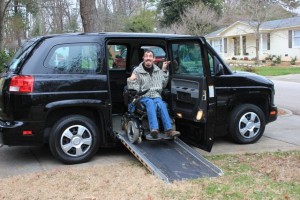
To this…
The story of the MV-1 is that of an underdog, much like our own! Hailed the new way of accessible transportation in 2011, MV-1 was being used as accessible taxicabs and expanded their market to the disability community. Yet, the company was not able to keep their doors open due to a stalled federal loan, and they paused production in early 2013.
But their story doesn’t end there! Recently bought by Mobility Ventures, a subsidiary of AM General, full production of their new line will begin in February of 2014, and they are now a full member of NMEDA. Mobility Ventures is still working on improving their model for the consumer market, such as mpg and addressing how drivers with disabilities have access to the driver’s seat. Since Megan will be the primary driver, we feel the MV-1 will fit our needs well.
The Orlando dealer had not seen an MV-1 in some time. But—just before Megan’s call, a lightly used 2011 factory model under the old company name had just come in.
Two days later, we put down enough to hold the vehicle so we could make a decision. And—ironically Barton’s family, who fully matched our fundraising efforts, was going to Florida just before Christmas, not too far from the dealership!
We persevered through so many challenges with this experience, we didn’t take the easy way out, we had a lot of help to get there, we felt disappointment and disappointed people along the way and still persevered, and we believed that if we could just hang in there long enough, it would happen.
AND WE (ALL) DID IT!!!!!
This blog isn’t just about us, though. It’s about you, too. What challenge do you have ahead of you that seems impossible? As we have brought others along for the ride of struggle and disappointments, in this success, we have given others hope that if they just hang in there long enough, they will overcome their own challenges.
There are so many supporters to thank:
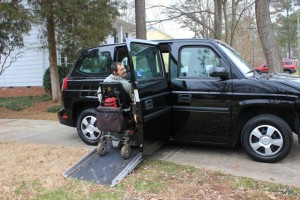
Barton trying out the ramp (up, down, up, down).
We want to thank, honor, and acknowledge Barton’s family and extended family members, Megan’s family and extended family members, Sam House, Helen House, Go Fund Me, all Go Fund Me contributors, Katie Empie, Jeff Gorman and Jennifer Gorman, The Huffington Post, The Mobility Resource, Christ Church of Raleigh, Betty White, Ginny McKay, Van Products of Raleigh NC (who sponsored transportation for our book release events in the spring and summer), Steve Potts, Ann Hillman Lamy, Kate Leaming Goldberg, R-MWC alumnae & classmates, everyone who took time out of their day and endless effort until the very end voting for us during the NMEDA contest, and so many others who made this dream a reality!
THANK YOU!!

